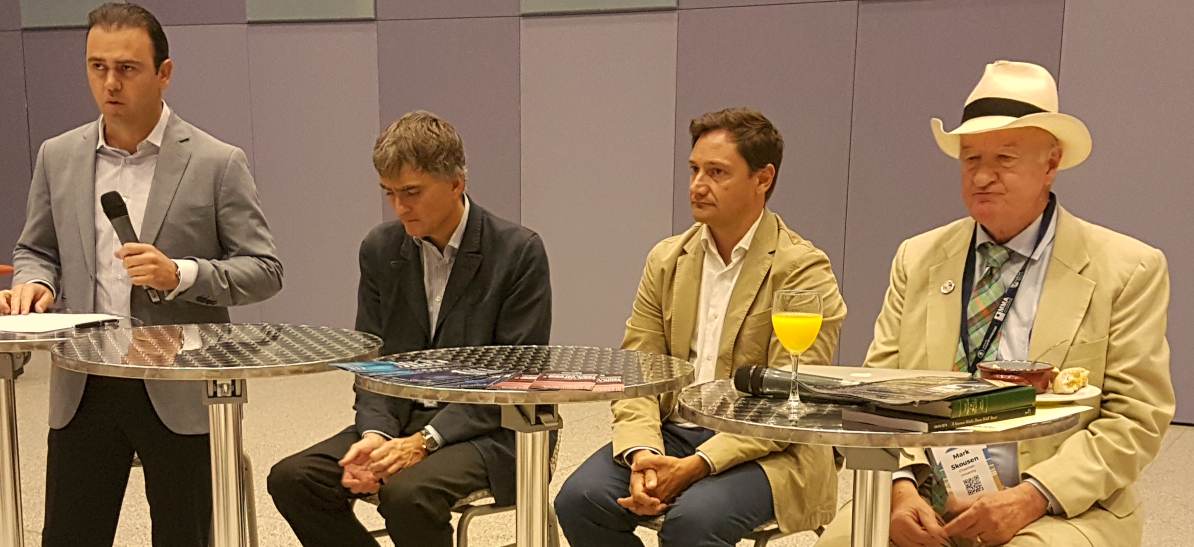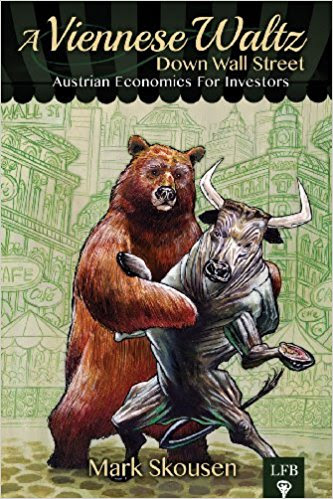Which Is Better, Value or Growth Investing?
I am at the Mont Pelerin Society meetings in the Canary Islands, Spain, enjoying a beautiful resort setting.
Members of the Mont Pelerin Society are political and economic experts who come together from around the world. I’ve been attending the group’s meetings since I was invited by Milton Friedman in 1988 — 30 years ago. That gathering was in Tokyo, and I’ve been a member since 2002.

Mark Skousen (far right) participates in a panel discussion at the 2018 Mont Pelerin Society meeting.
This morning’s breakfast panel featured a discussion on value investing and the Austrian theory of the business cycle. I was joined by a couple of money managers from Latin America who use Austrian economics to find undervalued stocks and funds.
During this panel, I made two central points. First, value investing — buying stocks that are undervalued compared to other stocks — is a good long-term strategy, but one that requires patience. Often, the price of an undervalued stock can go lower before it goes higher.
As Wendell Brock once said, and as I quoted him in “The Maxims of Wall Street:”
“Nothing makes the spirit fly higher
Than finding a bargain when you are the buyer;
And nothing makes the spirit sink deeper
Than finding it later a whole lot cheaper.”
Beware of the ‘Austrian’ Gold Bugs Who Are Super Bearish
My second point was that the Austrian theory of the business cycle offers occasional opportunities to buy ridiculously cheap stocks. According to Austrian economists Ludwig von Mises and Friedrich Hayek, the easy money policies of the government create an unsustainable boom of malinvestments that can only collapse into a bust-and-bear market. Good stocks can fall 50% or more during the inevitable downturn.
Most financial gurus influenced by the Austrian theory of the business cycle focus too much on the “bust” side of the business cycle rather than the “boom” side. Both Mises and Hayek were in this camp when they predcited the 1929 stock market crash, and were largely “permabears” after that event.
Bear markets are treacherous and usually end quickly. There are a few exceptions, though, such as the 1929-1939 Great Depression and the Japanese bear market that started in 1990.
However, most of the time, the boom phase and bull market last longer than most people expect.
As a financial economist who has studied and used Austrian economics, I prefer to emphasize the “boom” phase of the business cycle rather than the “bust” phase. This approach has been more profitable than those constantly fearing the beginning of a bear market.
Many doomsayers have been predicting the “Mother of all Bear Markets,” but the truth is that we are experiencing the “Mother of all BULL Markets.” Those who followed the Cassandras of today have had their financial heads handed to them.
How to Profit from The Austrian Theory of the Business Cycle

Want to know more about the Austrian theory? Check out my book, “A Viennese Waltz Down Wall Street: Austrian Economics for Investors,” available for only $20 from Ensign Publishing. Call them toll-free at 1-866-254-2057. I pay postage and autograph each copy.
Update on Cruise to the REAL Cuba: Make a Reservation NOW!
I’m organizing a private cruise to visit Cuba next year on November 9-16, 2019 aboard the five-star Oceania Insignia. I know it’s more than a year away, but cruises to Cuba are hot, and the cabin space is filling up fast.
This week-long trip to Cuba is special — we will be given a private tour in Havana by a free-market economist who actually lives in Cuba and will show us parts of “communist-controlled” Havana that no one else sees.
Greg Galloway, director of Fund Advisors of America, and I will update you on your investments. Dave Phillips, president of Estate Planning Specialists, will be talk about estate planning after the Trump tax cuts. I will also be giving a talk on the important economic and cultural differences between Latin America and North America. And my wife Jo Ann, an English professor, will speak on Ernest Hemingway and Cuba.
This will be a small private conference with no more than 40 individuals. We’ve already sold 12 cabins. Please call Nicole at the MoneyShow (who is organizing the cruise for us), toll-free, at 1-844-225-5838 for a free color brochure and to make a deposit. Cabins are available as little as $2,399 per person/double occupancy.
Upcoming Conferences
O New Orleans Investment Conference, New Orleans Hilton, Nov. 1-3: This is the granddaddy of hard-money conventions. I’ll be there this year to speak on a controversial subject: “Investors, Beware! Why Gold Bugs and Austrian Economists Often Offer Bad Investment Advice.” They typically are right in theory, but their timing is off, and that can hurt your portfolio. Don’t miss other celebrity speakers including Mark Steyn, Jim Grant, Jonah Goldberg, Dennis Gartman, Rick Rule, Robert Kiyosaki and Brien Lundin. Be sure to mention you’re a subscriber to Forecasts & Strategies when you register. To register, click here or call toll-free 1-800-648-8411.
You Blew It! Peter Thiel Favors Trump Trade War!
“Let me make the libertarian case for tariffs…” — Peter Thiel at the Mont Pelerin Society meeting
One of the keynote speakers at the Mont Pelerin Society meeting was Peter Thiel, who was interviewed by Lord Matt Ridley. Peter is a long-time friend and billionaire libertarian who has spoken at FreedomFest several times. He is also a defender of Trump’s economic policies.
Tax cuts and deregulation are standard Republican fare, which I support. However, I was surprised to hear that Thiel is also a defender of the Trump negotiating techniques that use trade war tactics of protectionism and tariffs. He told a skeptical audience, “Let me make the libertarian case for tariffs.”
He linked tariffs to the welfare system, arguing that our free-trade policies have ruined the car and textile industries in America, putting millions of people on welfare.
I agree that free trade can be disruptive and cause short-term unemployment, but most people have found new, often better, jobs, and our overall standard of living is higher as a result.
Ben Franklin said it best, “No nation was ever ruined by trade.”

